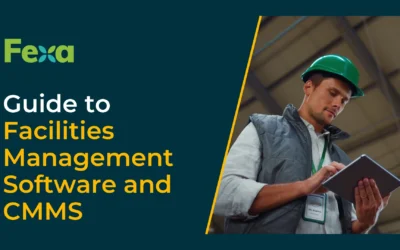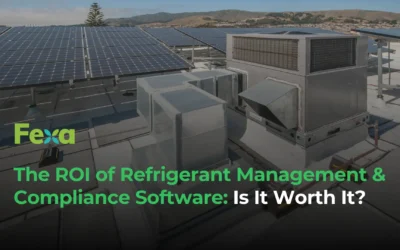ARTICLE
10 Questions To Ask Before You Write Your Next CMMS RFP
When it’s time to choose a new CMMS, there are a lot of things to consider! Most of the time, you are switching because there is a problem with your current CMMS. That means that your biggest priority is probably “Fix the problem!”
But it’s important to look beyond just one or two CMMS issues when making a decision, though. Next time you are preparing an RFP, consider these 10 must-ask questions. Taking a comprehensive look at your needs and the offerings of each CMMS will help you make the best possible choice.
But first – what is a CMMS RFP?
An RFP (Request for Proposal) is a formal document that organizations create when they’re looking to solicit bids from contractors or service providers for a project. A CMMS RFP, then, is created when an organization wants to purchase a new Computerized Maintenance Management System.
The RFP outlines the organization’s specific requirements, technical specifications, and business needs related to their maintenance management software solution. It allows potential vendors to understand the scope of work and submit detailed proposals.
Typically, a CMMS RFP includes information about:
- the organization’s current processes
- required functions of the CMMS
- technical requirements
- budget considerations
- timeline expectations
- evaluation criteria
Consider your CMMS RFP as both a solicitation tool for receiving competitive bids from CMMS providers and a framework for comparing multiple vendors’ offerings in a standard, easy-to-process way.
The better your RFP, the more effective the bids will be from CMMS providers. But what do you need to consider before you build that RFP? What do you need to build into the RFP to ensure that you get the best possible bids?
10 Questions to Ask Potential CMMS Providers
Let’s jump into the 10 questions that you need to ask CMMS providers.
1. How independent is your company in terms of ownership, service provider relationships, and overall business model?
Follow-up questions:
- Is your company independently owned or part of a larger corporation?
- Do you require customers to use specific service providers from your network?
- What is your revenue model beyond the software fees?
- How do you handle customer requests for integration with existing service providers?
These questions are important because when a CMMS provider is part of a larger corporation , you might face slower response times and less flexibility since decisions often have to go through corporate channels. Independent providers can often be more agile and focused solely on CMMS excellence.
The service provider network question is particularly critical because many CMMS companies make significant revenue through provider fees. If they require you to use their network, this can:
- Force you to abandon existing trusted relationships with service providers
- Result in hidden costs as providers increase their rates to cover network fees
- Reduce your negotiating power over pricing and service quality
- Limit your ability to choose specialists for specific needs
When you understand the provider’s revenue model, you can identify any potential hidden costs. For example, some providers may include surprisingly low software fees in their bid. But they may be making up the difference by requiring you to use their service provider network, adding high transaction fees, or implementing additional charges for “premium” features.
2. What is your fee structure, including any potential direct and indirect costs?
Follow-up questions:
- What are the fees associated with implementation, training, support, and maintenance of your CMMS?
- Are there any charges that go into effect after implementation?
- If we have special requests or customization needs, what will that cost?
These questions about cost structure are really about transparency. You need to uncover the total cost of ownership (TCO) if you want to avoid any unexpected expenses. Nobody wants surprises in the budget, after all!
As your business grows, you may need additional services, so asking lots of questions in this area will help you anticipate potential future charges. These could include:
- Additional user licenses
- New modules or features
- Custom reports
- Workflow modifications
- Integration with new systems
- Additional training
This is what you don’t want to happen: you don’t want to end up locked into a system that becomes increasingly expensive to maintain. It is important to choose a platform that can grow with your business and remain flexible as you move into the future.
3. How configurable is your platform?
Follow-up questions:
- How much can we configure the platform without requiring developers to get involved?
- Can we modify our workflows independently after implementation?
- Is your mobile platform able to be used in the field?
A configurable, flexible CMMS offers a competitive advantage over more rigid programs, because it can be adapted as your needs change. These questions help you understand how much configurability the provider has.
Configurability matters! If you need to go back to the developer every time you need to make a small change to your platform, it’s going to be expensive, time-consuming, and frustrating for your team. Ideally, your platform will offer the customization options you need to support your operations and meet your business requirements.
A configurable CMMS with a great app will ensure:
- your field technicians have real-time access to their work orders
- your teams can run real-time status updates from any location or facility
- you can improve your response time
- you can avoid inefficiencies and delays in service delivery
4. What does data management look like with your CMMS? How can ensure accurate data migration and solid system integration with our existing business tools?
Follow-up questions:
- How can we ensure accurate data migration?
- Can you integrate your CMMS into our existing business tools?
- How customizable are your reporting tools?
- What real-time analytics capabilities does the platform offer?
These questions are important because the answers determine how effectively the platform will manage your data. The right CMMS will offer full reporting capabilities and accurate contractor scorecards, both of which allow you to understand and improve your operations.
Data analytics affect your ability to:
- Make timely decisions
- Respond to issues promptly
- Monitor current performance
- Identify and address problems before they escalate
- Track KPIs in real-time
5. Do you have a comprehensive support structure that includes response times, personnel allocation, and escalation processes?
Follow-up questions:
- What is your platform’s average response time for support issues?
- Do you have dedicated support personnel?
- How do you escalate critical issues?
- What happens if we have problems after-hours?
Sometimes, a low-cost CMMS provider is also a low-support provider. Unfortunately, this can negatively impact your operations. Technology issues are unavoidable, but what happens when these inevitabilities occur?
When you have dedicated support personnel who understand your business, they can keep response times low and efficiency high. You want to avoid working with a CMMS that takes a week or more to respond to your concerns, as well as those that charge extra for assistance.
6. Does your CMMS evolve to meet our needs and support our growth?
Follow-up questions:
- How often do you release updates?
- Do you have a product roadmap that demonstrates your platform goals?
- Do you incorporate customer feedback into your product development?
- Will we outgrow your platform if we meet our business goals?
Choosing a responsive, evolving CMMS will ensure that you don’t end up outgrowing the platform, which would in turn lead to you needing to choose another CMMS.
If the company has a product roadmap, it shows their commitment to improvement and indicates their investment in technology. A future-focused CMMS will support your own future-focused operations! It’s even better if this roadmap incorporates customer feedback.
No matter what industry you’re in, change is always going to be a factor in your operations. Your CMMS needs to be able to adapt to the changes in your industry.
Last but not least, scalability is important because it accommodates your growth in multiple areas, including:
- Users
- Locations
- Service providers
- Work order volume
- Reporting needs
7. What is the platform’s approach to implementation?
Follow-up questions:
- What is your implementation timeline?
- What training do we need to complete following implementation?
- What is your approach to change management?
These logistics-based questions will help you anticipate how quickly you will have your new platform up and running. The urgency of your current needs will play a role in how important these questions are. If you have all the time in the world, you may not mind a long implementation process. But if your current CMMS is causing problems for your day-to-day operations, you are going to want to implement the new platform quickly.
The implementation timeline affects many elements of your operations, including:
- Business continuity
- Resource allocation decisions
- Budgeting
- Stakeholder involvement
- Business cycle alignment
Another thing to consider is ongoing training resources. Will it be easy for new staff to be trained on the CMMS once it is implemented? How often will advanced or new features require additional staff training?
Finally, make sure your CMMS understands the potential resistance to change. It’s normal for employees to be change-averse, and true success requires stakeholder buy-in. Make sure that the CMMS you choose provides proper support for your team members who will experience the most change because of the new platform. Pay attention to how the platform’s representatives communicate, because communication is such an important part of change management!
8. How do you maintain quality control within your network of service providers?
Follow-up questions:
- Do you vet your service providers?
- How do you maintain updated provider information?
- What is your approach to performance monitoring?
- If we are unsatisfied by a provider’s performance, what are our options?
Vetting providers is so important for facilities maintenance! It includes things like making sure that everyone has proper licensing and insurance coverage, in addition to confirming their capabilities to do the work.
Your CMMS should maintain up-to-date provider information (including contact details, certifications, pricing agreements, and service area coverage) so that you always have the right person for the task at hand. If a provider underperforms, your CMMS should notify you of the issue and provide a pathway to dealing with the underperformance.
9. How do you ensure platform security?
Follow-up questions:
- What security certifications does your platform maintain?
- How do you protect our sensitive business data?
- What is your disaster recovery process?
- How do you handle regulatory compliance updates related to business data?
When it comes to choosing a CMMS, platform security is paramount. Your risk tolerance for security breaches should be very low, and your CMMS plays a big part in making sure that you prevent those breaches.
Consider the following issues, all related to platform security:
- Adherence to data protection standards
- Compliance with industry-specific regulations
- Regular audits to confirm high security performance
- Impeccable customer data management
- Protected employee data
- Security of proprietary company information
- Ethical and responsible use of AI tools
10. How can you support our goal of 100% compliance with EPA regulations for refrigerant management?
Follow-up questions:
- Does your CMMS provide specialized support for refrigerant management?
- How do you maintain safety standards for refrigerants and other hazardous materials?
- Does your CMMS provide clear documentation for reporting and compliance purposes?
There is nothing optional about compliance with EPA standards related to refrigerant management. There are very few companies operating in the US that never interact with refrigerants, considering almost every company has facilities with an HVAC or Refrigeration system (HVAC/R).
Regulatory compliance updates include:
- EPA regulations for refrigerants
- Industry-specific requirements
- Local code compliance
- Safety standards
- Environmental regulations
- Documentation requirements
Because EPA compliance is legally required, non-compliance can result in costly fines. Additionally, today’s consumers expect the companies they work with to be environmentally responsible. Prioritizing sustainability and environmentalism is good business.
Why Choose Fexa as Your New CMMS Provider?
The next time you write a CMMS RFP, make sure to accept bids from Fexa, the nation’s leading flexible CMMS provider.
Unlike our competitors who are owned by much larger conglomerates, Fexa maintains its independence. That allows us to focus exclusively on facilities management software development–and our customers’ success!
We are an innovative and future-proof organization with a commitment to building a better way through more efficient processes and new technologies.
Here’s what sets Fexa aside:
- We have a “Human First” set of values
- We emphasize customer service as a core value
- We focus on working together to make the most of our collaborative service provider network
- We value flexibility more than any of our competitors, which is why we are at the top of the line for customization
With over a decade of experience in facilities management and a client list that includes major brands like Tesla, Crate & Barrel, and Dollar General we demonstrate a deep understanding of this essential industry.
Reach out to us if you’re ready to put our combination of independence and innovation to work! Fexa is a strong contender for organizations that need a CMMS provider to address the critical concerns we’ve discussed throughout our guide to writing a RFP.
Get Started With Fexa
When you’re ready to learn more about what Fexa’s outstanding CMMS has to offer, contact us for a demonstration. We can’t wait to show you what we can do.
Say goodbye to the never-ending to-do list.
Blog
Related Articles
Stay ahead of the curve with our insightful articles, expert opinions, and innovative trends. We are committed to providing you with valuable information and industry insights to help you optimize and manage your facility more effectively.
Guide to Service Provider and Vendor Management
SERVICE PROVIDER & VENDOR MANAGEMENTGuide to Service Provider and Vendor ManagementHere's your ultimate guide to service provider and vendor management.Effective service provider and vendor management in operational environments is vital to maintaining cost...
Guide to Facilities Management Software and CMMS
FACILITIES MANAGEMENT / FEXA CMMSGuide to Facilities Management Software and CMMSHere's your ultimate guide to selecting the right facilities management software.Every time one of your facilities experiences a maintenance failure or equipment breakdown, it impacts...
The ROI of Refrigerant Management & Compliance Software: Is It Worth It?
ARTICLEThe ROI of Refrigerant Management & Compliance Software: Is It Worth It?Explore how refrigerant management software reduces costs, improves efficiency, and ensures compliance.Effective refrigerant management is no longer just a regulatory requirement—it’s a...




